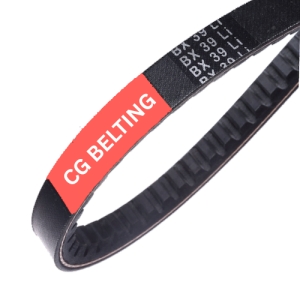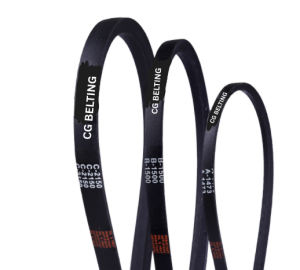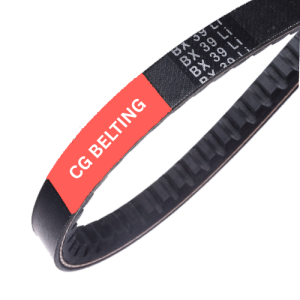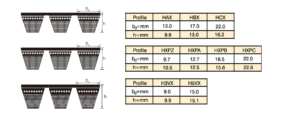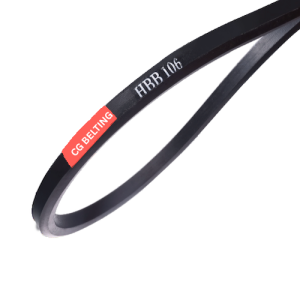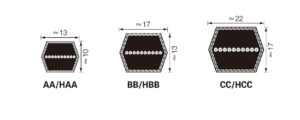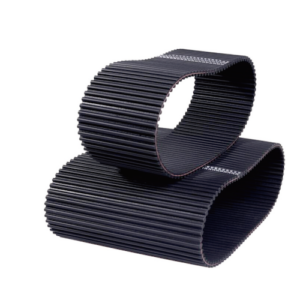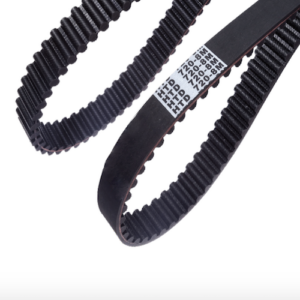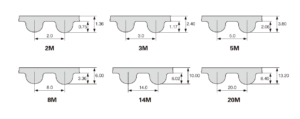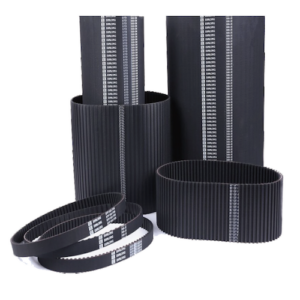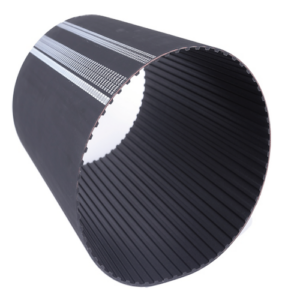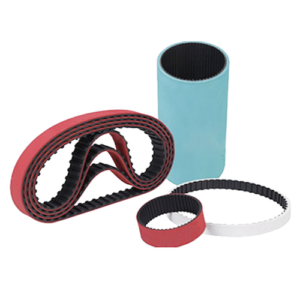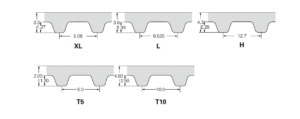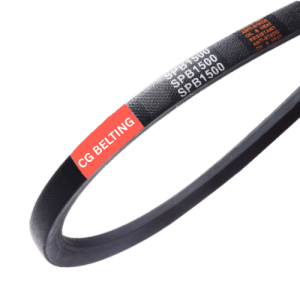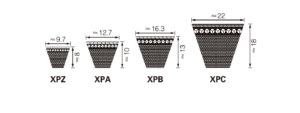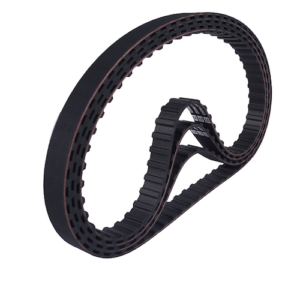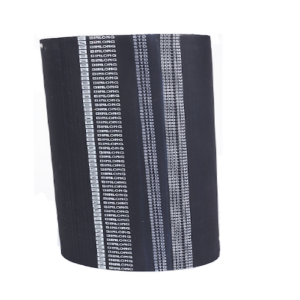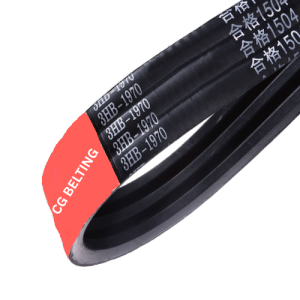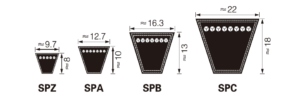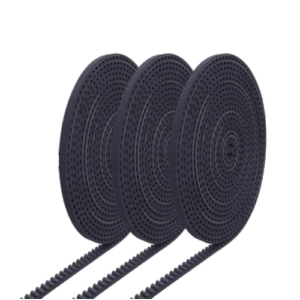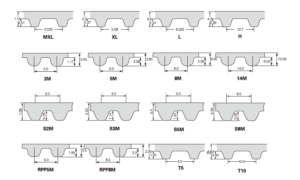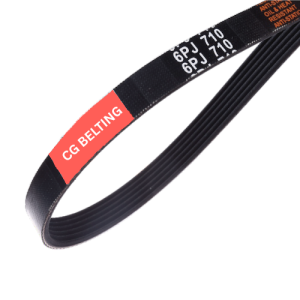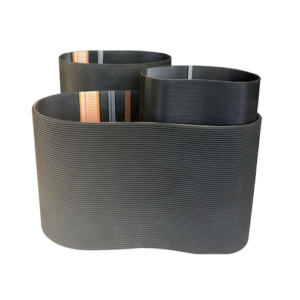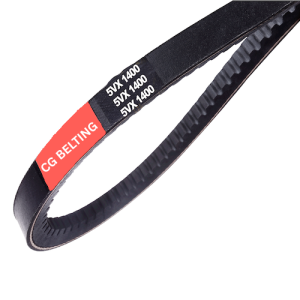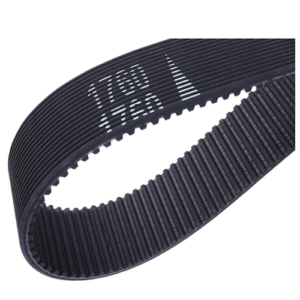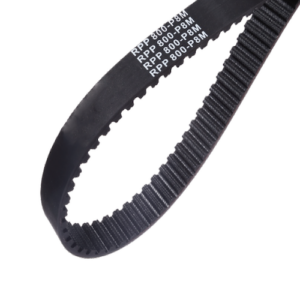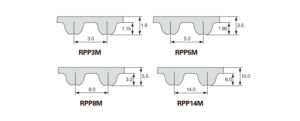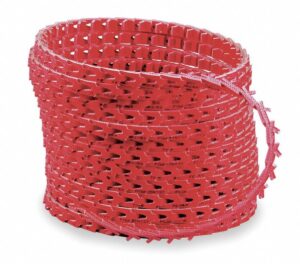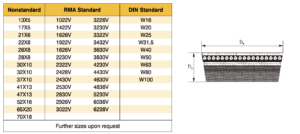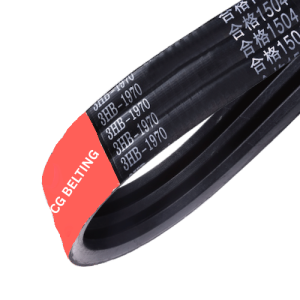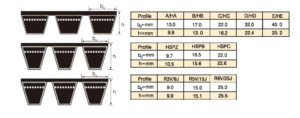Belts
Showing 1–20 of 21 results
-
Belts
Classical Raw Edge Cogged V-belt
Read moreBelts with cogs underside thereby reducing the bending resistance of the belts and allowing them to operate on pulleys with approximately 20% smaller diameters. The decreased bending resistance reduces mechanical efficiency and reduced working temperature. Heat dissipation is further improved by the larger area between the belt and the surrounding atmosphere and also by the air turbulence around the cogs during operation. These belts require a higher tension than the wrapped belts so as to exhibit higher power transmission capacity.
-
Belts
Classical V-Belts
Request Quote This product has multiple variants. The options may be chosen on the product pageClassical V-belts are one of the most common types of power transmission belts used in industrial and automotive applications. They are designed to transmit power between pulleys through friction, offering a cost-effective and efficient means of transmitting rotary motion. Power cables and compound are wrapped with a textile cover, and assure maximum protection against heat, oil, ozone.
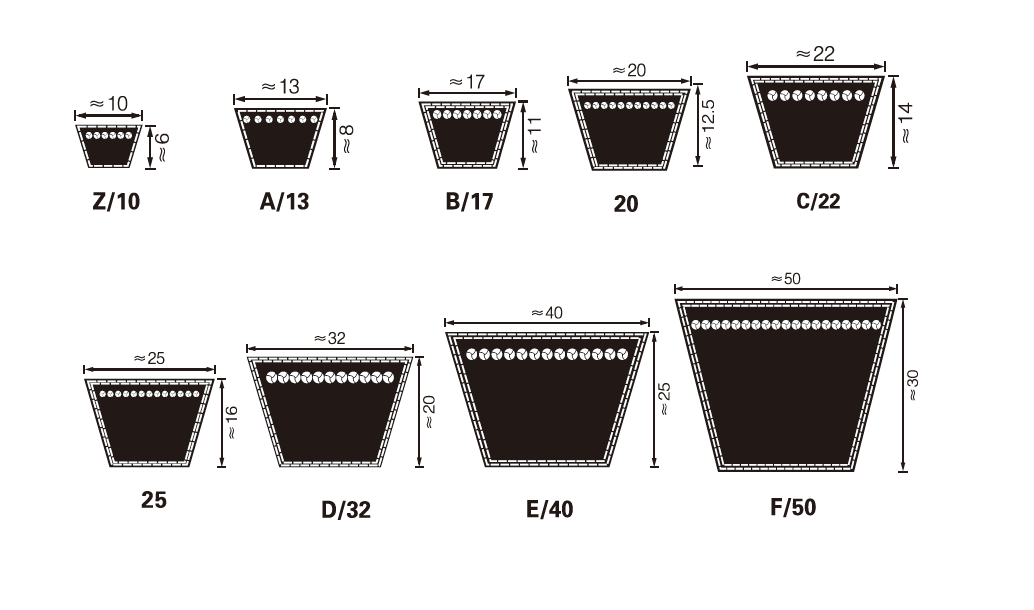
-
Belts
Cogged Banded V-Belts
Read moreCogged banded belts are an excellent choice for virtually any application where increased horsepower capacity or output is needed. Or where conventional, single or multiple belt drives are impractical because of space or weight limitations. BINLONG banding process assures smoother, quieter operations. The specially compounded wrap construction is ideal for clutching operations. And it won’t turn over or jump off the drive.
-
Belts
Double Section V-Belts
Request Quote This product has multiple variants. The options may be chosen on the product pageDouble V-belts, also known as hexagonal V-belts, are designed to transmit power from both sides of the belt. Unlike standard classical V-belts, which only have one working surface, double V-belts have a symmetric trapezoidal cross-section, allowing them to engage pulleys on both sides. The neutral axis containing the tension member is exactly halfway up the section.
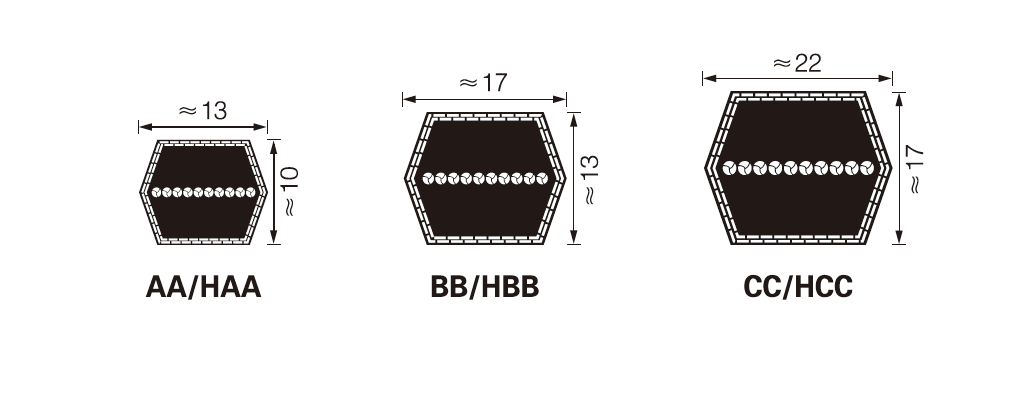
-
Belts
Double Sided Timing Belts
Request Quote This product has multiple variants. The options may be chosen on the product pageDouble-sided timing belts, also known as dual-sided synchronous belts, feature teeth on both sides of the belt. This design allows the belt to transmit power from both sides, making them ideal for reverse-motion applications, serpentine belt drives, and multi-axis power transmission systems. The structure of double-sided timing belts contain teeth on both sides which enables power transmission in both directions. They contain high-tensile strength cords which are reinforced with fiberglass, aramid (Kevlar), or steel for low stretch and high torque capacity. They have a rubber or polyurethane construction which provides resistance to oil, chemicals, and temperature variations. They are available in trapezoidal, HTD, and STD Profiles depending on torque and efficiency needs.
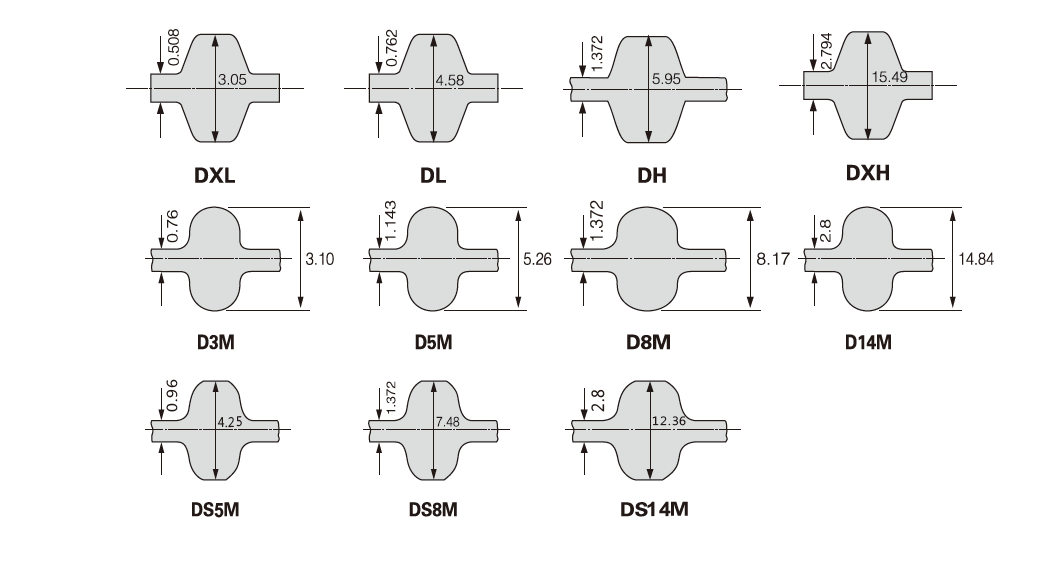
-
Belts
HTD Type Timing Belts
Read moreHTD belts have a larger, more robust tooth profile for increased capacity, as compared to trapezoidal timing belts. They are suitable for many applications including data storage, hand power tools, postage handling, food processors, office machines, centrifuges, money handling, medical diagnostic, sewing machines, ticket dispensers, robotics, vending machines, and vacuum cleaners.
-
Belts
Imperial Timing Belts
Request Quote This product has multiple variants. The options may be chosen on the product pageImperial timing belts, also known as inch-based timing belts, use a toothed profile for precise motion transfer without slippage. These belts follow the imperial (inch-based) pitch system rather than the metric system, and they are widely used in older machines, automotive applications, and industrial equipment.

-
Belts
Linatex/Top Coating Timing belts
Read moreCoating Timing Belt opens up new segment of market in packaging industry and lighter material carrying application where power transmission is to be done with the help of timing
- Belt with soft profile top rubber is used for conveying lighter & fragile materials where no scratches are desirable like in shampoo sachet making, wafer manufacturing industry and bottling plants.
- Belt with regular profile top rubber is used in wire drawing &cable industries for giving support in take-up caterpillar &other similar operations in manufacturing industries.
- Operating Temperature Range: -18°Cto +80°C
- Product Range: Available in all Timing belt sections
-
Belts
Metric Raw Edge Cogged V-Belts
Read moreXP series belts have the same description as the METRIC WRAPPED V-BELTS DIN 7753 SPZ – SPA – SPB and SPC, except they are raw edge cogged, for the rest they are identical. Due to the fact they are cogged the designation is slightly different. Basically, it is the same except for the S which is replaced by an X to indicate they are cogged. This means an SPZ becomes an XPZ, an SPA an XPA and so on.
-
Belts
Metric Timing belts
Request Quote This product has multiple variants. The options may be chosen on the product pageMetric timing belts are synchronous belts that use a toothed profile to ensure precise motion transfer without slippage. Unlike V-belts, which rely on friction, timing belts engage directly with pulleys via teeth, providing exact positioning and efficient power transmission. They provide precise, reliable, and efficient power transmission for automation, robotics, CNC, automotive, and medical equipment.
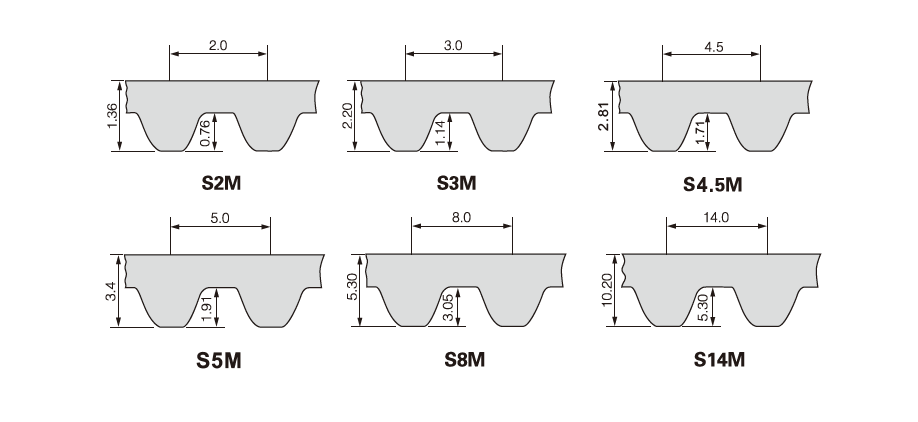
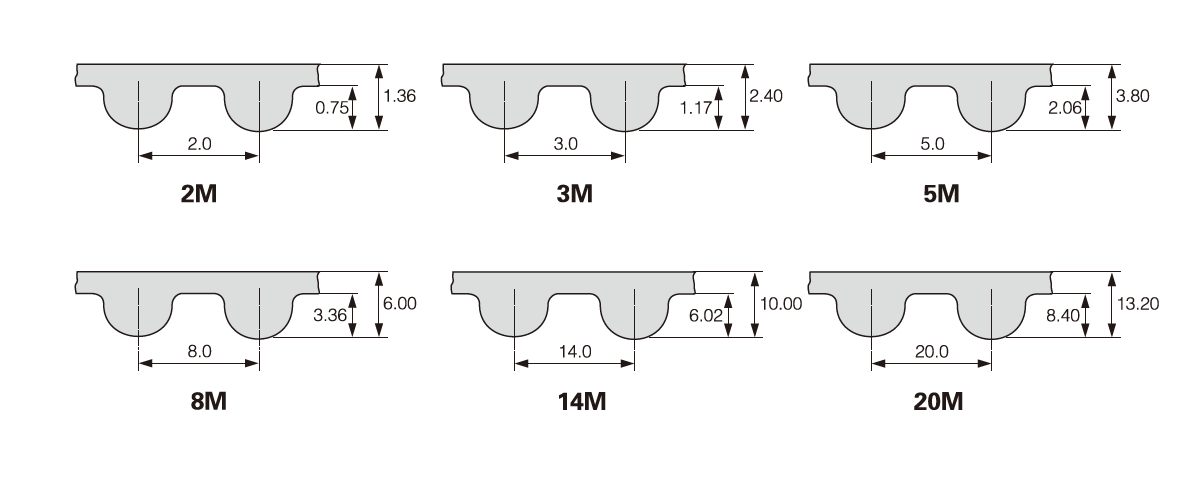
-
Belts
Metric Wrapped Wedge V-Belts
Read moreMetric Wrapped V-Belts allow more power per belt and therefore permit wedge belt drives. They are also matched, oil-heat resistant and static dissipating. As a general rule, the numbering system starts by SP letters, followed by the cross-section designations Z-A-B-C and numbers giving the pitch length. However, some belts will either identify the length by adding the following letters after the number, LA for outside circumference LI for inside circumference, or LW for pitch circumference.
-
Belts
Open-End Timing Belts
Read moreRubber Open-End Belting is well suited for use in positioning applications, which is a cost effective, low maintenance drive alternative.
MARKETS/APPLICATIONS:
Well suited for linear movement, positioning and conveying applications.
-
Belts
Poly V-Belts
Read morePoly-V belts, also known as multi-ribbed belts, are a type of power transmission belt that combines the benefits of flat belts and V-belts. They have multiple longitudinal ribs running along their length, which improve grip and power transmission while reducing slippage. Unlike classical V-belts, which rely on a single trapezoidal profile, poly-V belts have multiple small ribs. The ribbed design increases the surface contact area with pulleys, improving friction and reducing belt tension requirements.
Made from rubber with fiber reinforcement, they provide high flexibility, resistance to wear, and excellent power transmission efficiency.

-
Belts
Raw Edge Cogged Wedge V-belts
Read moreRaw Edge Cogged Wedge V-belts are a specialized type of V-belt designed for higher power transmission, better flexibility, and enhanced grip compared to classical V-belts. These belts feature a raw (uncut) edge and internal cogs (notches) that improve bending ability and heat dissipation. The belt’s wedge angle is steeper than classical V-belts, allowing for higher power transmission in a smaller space.
With Raw Edge belts, the sides of the belt are not wrapped in fabric, allowing for a stronger grip on the pulley. The inner surface of the belt has precision-cut cogs (teeth), which:
- Improve flexibility, allowing use with smaller pulleys.
- Reduce heat buildup, improving belt longevity.
- Enhance energy efficiency by reducing slippage.
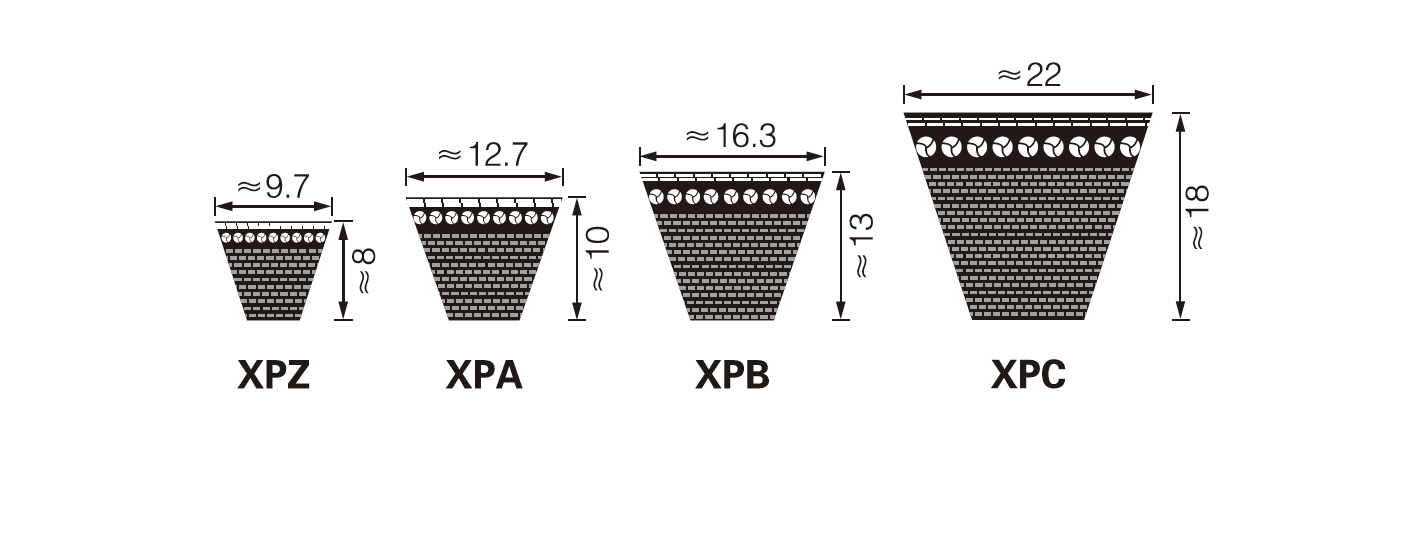
-
Belts
Roller Mill Belts
Read more- Special rubber compound for high frictional grip
- Ribbed driving surface for maximum area of contact and reduced surface pressure
- Fiberglass cord for high tensile strength, excellent flex life and high resistance to elongation
- Polychloroprene rubber teeth for perfect bonding, protecting the cords from oil, grease, and moisture
- Sprocket side of the timing belt has special woven nylon fabric which is chemically treated to reduce friction it is resistant to heat and abrasion, protecting the teeth from getting damaged
-
Belts
RPP Type Timing belts
Read moreRPP belts have a larger, more robust tooth profile for increased capacity, as compared to trapezoidal timing belts. They are suitable for many applications including data storage, hand power tools, postage handling, food processors, office machines, centrifuges, money handling, medical diagnostic, sewing machines, ticket dispensers, robotics, vending machines and vacuum cleaners.
-
Belts
Synchronous Belts
Read moreSynchronous belts, commonly referred to as timing belts, are designed to provide precise power transmission with zero slippage. These belts use toothed profiles that engage directly with matching toothed pulleys, ensuring synchronized motion between rotating shafts.
Unlike classical V-belts, which rely on friction, synchronous belts allow for exact timing of components, making them essential in automation, robotics, CNC machines, and automotive engines.
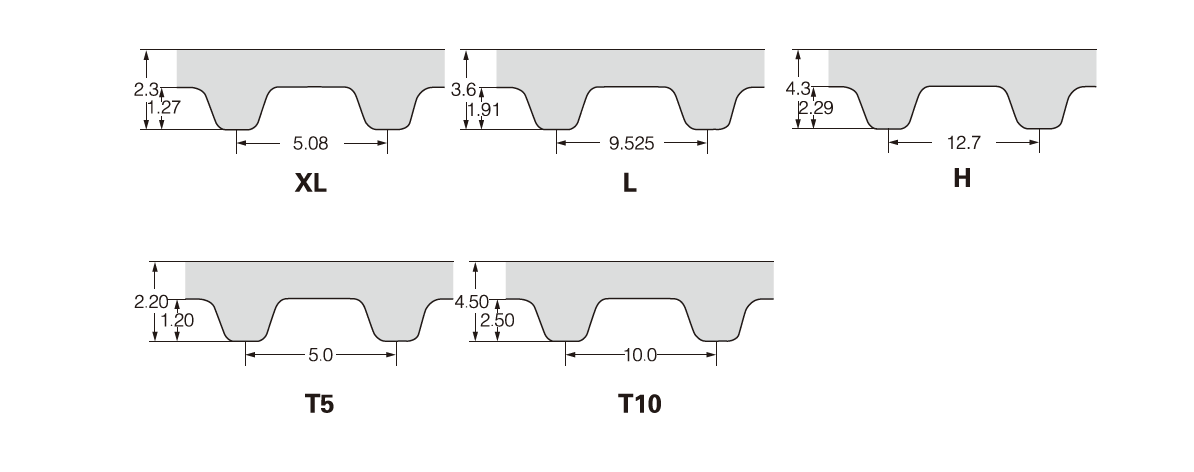
-
Belts
Twist Link Belts or Adjustable Belts
Request Quote This product has multiple variants. The options may be chosen on the product pageTwist link belts, also known as adjustable V-belts, are a modular alternative to traditional rubber V-belts, designed to be easily adjusted in length without requiring special tools. They are made from interlocking polyurethane/polyester links, allowing users to customize belt length on-site and replace damaged sections without dismantling the entire drive system. They have a modular link construction with individual belt segments (links) that are connected together, forming a flexible, high-strength belt. There is no Need for Pre-Measured Lengths as the belt can be cut to any length and reassembled. Most importantly they have a universal fit meaning that they can be used in any standard V-belt pulley (A, B, C, Z sections).
-
Belts
Variable Speed Belts
Request QuoteVariable speed belts or Adjustable Speed Belts are a specialized type of power transmission belt designed for variable-speed drives, where the speed of the driven shaft changes depending on the position of an adjustable pulley. These belts are commonly used in machines requiring controlled speed variations, such as industrial machinery, agricultural equipment, and automotive applications. They contain a wider cross-section which provides greater surface area for improved power transmission. They are flexible and strong with reinforced with aramid (Kevlar), polyester, or fiberglass cords to handle high dynamic loads and speed changes. They are resistant to wear and heat since they are made from specialized rubber compounds (e.g., neoprene, EPDM, or polyurethane) for increased oil, heat, and abrasion resistance. They are designed for variable pulley systems what work in expanding and contracting pulleys, allowing for continuous speed adjustments.
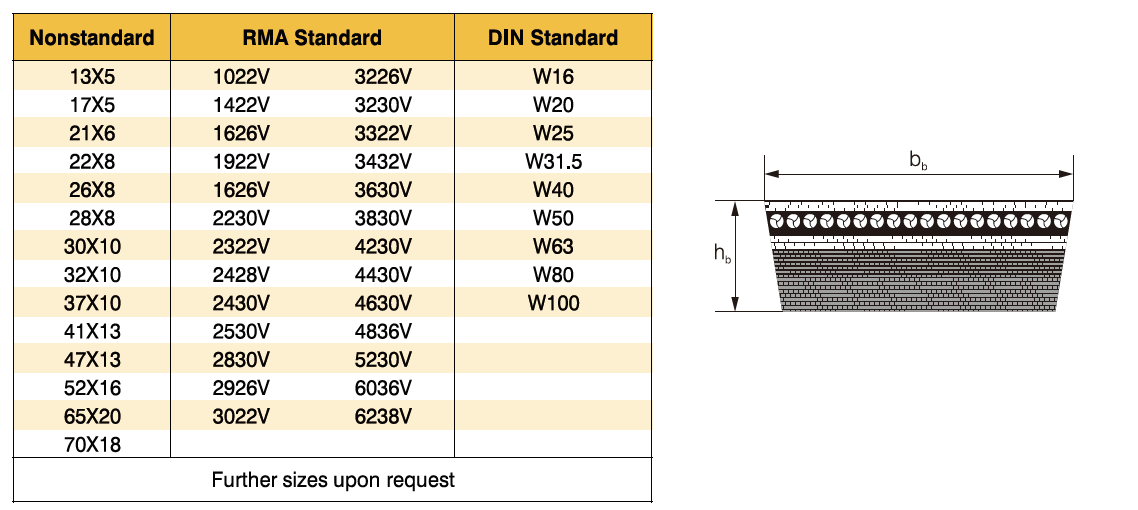
-
Belts
Wrapped Banded V-Belts
Read moreFEAUTURES:
- Enhanced power transmission capacity
- Antistatic, oil and heat resistant
- Better resistance to vibrations
- High stability and smooth running on the toughest drives
APPLICATIONS:
All Banded belts are high power belts. While using standard pulleys with a proper guard. Appropriate belt sitting for the belts and that of pulleys is the same. We recommend details before using banded belts to enable us to provide banded belts can lead to premature failure of the drive system these belts it is always recommended to use can only be obtained if the pitch maintained that the customer should get back to us with the best solution. Improper design using banded belts can lead to premature failure of the drive system.
- Severe vibrations
- Vertical shaft drives
- V-flat drives
- Agricultural drives
- Conveyer systems
- Stone crushers, reciprocating compressors, generator sets, pumps cold forging machine

